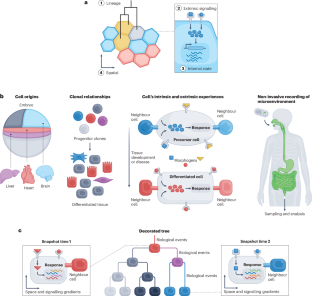记录细胞的生命
IF 52
1区 生物学
Q1 GENETICS & HEREDITY
引用次数: 0
摘要
一种生物学模式正在出现,即通过基因编程,细胞可以将自己的历史写入自己的基因组。随后可以读取这些记录,并重建细胞的历史,每个细胞的历史可能包括其血统关系、外在影响、内部状态和物理位置的记录。DNA 记录有可能改变我们研究发育和疾病过程的方式。基因组工程的最新进展推动了 DNA 记录系统的发展,与此同时,单细胞和空间 omics 技术也越来越多地实现了记录信息的恢复。结合计算和系统发育推断算法的进步,DNA记录范式已初见成效。在本《视角》中,我们将探讨 DNA 记录的原理和技术基础、细胞生物学的哪些方面可以记录、如何记录,以及我们预计这种范式将促成的发现类型。本文章由计算机程序翻译,如有差异,请以英文原文为准。


The lives of cells, recorded
A paradigm for biology is emerging in which cells can be genetically programmed to write their histories into their own genomes. These records can subsequently be read, and the cellular histories reconstructed, which for each cell could include a record of its lineage relationships, extrinsic influences, internal states and physical locations, over time. DNA recording has the potential to transform the way that we study developmental and disease processes. Recent advances in genome engineering are driving the development of systems for DNA recording, and meanwhile single-cell and spatial omics technologies increasingly enable the recovery of the recorded information. Combined with advances in computational and phylogenetic inference algorithms, the DNA recording paradigm is beginning to bear fruit. In this Perspective, we explore the rationale and technical basis of DNA recording, what aspects of cellular biology might be recorded and how, and the types of discovery that we anticipate this paradigm will enable. Recent advances in genome engineering are enabling the recording of cellular histories into genomes, with single-cell and spatial omics technologies enabling their reconstruction into cellular lineages, states and exposures. This Perspective explores the rationale and technical basis of DNA recording, what aspects of cellular biology can be recorded and how, and the types of discovery that DNA recording will enable when studying development and disease.
求助全文
通过发布文献求助,成功后即可免费获取论文全文。
去求助
来源期刊

Nature Reviews Genetics
生物-遗传学
CiteScore
57.40
自引率
0.50%
发文量
113
审稿时长
6-12 weeks
期刊介绍:
At Nature Reviews Genetics, our goal is to be the leading source of reviews and commentaries for the scientific communities we serve. We are dedicated to publishing authoritative articles that are easily accessible to our readers. We believe in enhancing our articles with clear and understandable figures, tables, and other display items. Our aim is to provide an unparalleled service to authors, referees, and readers, and we are committed to maximizing the usefulness and impact of each article we publish.
Within our journal, we publish a range of content including Research Highlights, Comments, Reviews, and Perspectives that are relevant to geneticists and genomicists. With our broad scope, we ensure that the articles we publish reach the widest possible audience.
As part of the Nature Reviews portfolio of journals, we strive to uphold the high standards and reputation associated with this esteemed collection of publications.
 求助内容:
求助内容: 应助结果提醒方式:
应助结果提醒方式:


